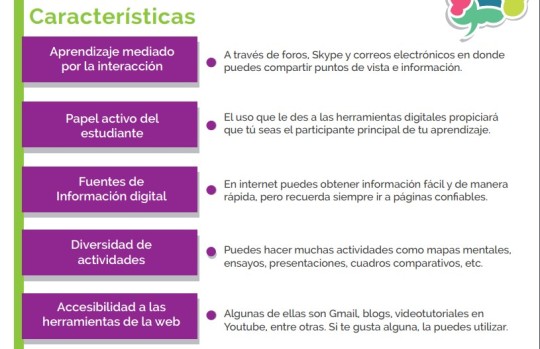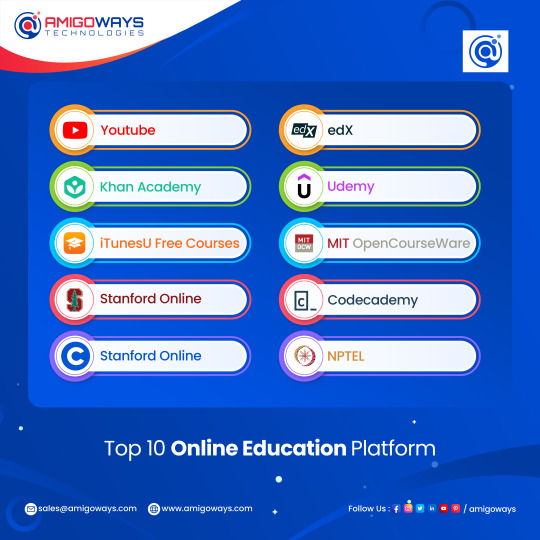#khanacademy
Text

Here are the 10 Best Online Education Apps
Explore the ultimate guide to the best online education apps that cater to different learning styles and subjects. Enhance your learning experience today.
#OnlineEducationApps#KhanAcademy#Coursera#Duolingo#Udemy#edX#Skillshare#Brilliant#Codecademy#MasterClass#Elevate
0 notes
Text
youtube
Understanding The ILSS Emerging Women’s Leadership Program
Prachi Luthra, Senior Program Lead - State Partnerships, Khan Academy, and Tripti Singh, Manager - Crafts and Livelihood, Mijwan Welfare Society, both alumni of the ILSS Emerging Women's Leadership Program, share their first-hand perspectives, experiences, and the continuing benefits of the Program.
#ILSS#EmergingWomensLeadership#PrachiLuthra#TriptiSingh#KhanAcademy#MijwanWelfareSociety#LeadershipDevelopment#Youtube
0 notes
Text
¿Qué es el EPA? (Entorno Personal de Aprendizaje)

El EPA, o Entorno Personal de Aprendizaje
Se refiere a un conjunto de herramientas, recursos y actividades que una persona utiliza para adquirir conocimientos y desarrollar habilidades de manera autónoma. El EPA es personalizado, ya que cada individuo puede elegir las herramientas y recursos que mejor se adapten a sus necesidades y preferencias de aprendizaje.
El concepto de EPA se basa en la idea de que el aprendizaje ya no se limita a los entornos formales, como el aula escolar, sino que puede ocurrir en cualquier momento y lugar. Con la ayuda de la tecnología y las plataformas en línea, las personas pueden acceder a una amplia gama de recursos educativos, como cursos en línea, tutoriales, videos, podcasts, foros de discusión, entre otros.
El EPA se construye a partir de la combinación de diferentes elementos, como blogs, redes sociales, gestores de información, herramientas de colaboración, comunidades en línea, entre otros. Estas herramientas permiten a los individuos organizar, gestionar y compartir información, establecer conexiones con otras personas interesadas en temas similares y acceder a fuentes de conocimiento relevantes para sus necesidades de aprendizaje.
El EPA no solo se trata de consumir información, sino también de crear y compartir conocimiento. Los individuos pueden generar su propio contenido, participar en comunidades de aprendizaje, colaborar con otros en proyectos y reflexionar sobre su propio proceso de aprendizaje.
El Entorno Personal de Aprendizaje (en inglés: Personal Learning Environment, PLE) es el conjunto de herramientas y recursos (documentos, audios, videos, actividades, fuentes de información, etc.) utilizados para la gestión del aprendizaje personal, generalmente virtual.
Se pueden encontrar mediante una computadora mediante software o internet. La finalidad de estas herramientas es de uso académico, por ejemplo, Microsoft Office. Puedes seleccionar información, crear documentos, mapas mentales, presentaciones, etcétera.
Características:

Características más importantes del Entorno Personal de Aprendizaje (EPA)
Características del EPAPersonalizado: Cada individuo puede crear su propio EPA, seleccionando las herramientas y recursos que mejor se adapten a sus necesidades y preferencias de aprendizaje.Autonomía: El EPA fomenta el aprendizaje autónomo, permitiendo a las personas tomar el control de su proceso de aprendizaje y establecer sus propias metas y estrategias.Tecnología: El EPA se basa en el uso de tecnología y herramientas digitales, como plataformas en línea, redes sociales, blogs, gestores de información, entre otros.Diversidad de recursos: El EPA ofrece una amplia gama de recursos educativos disponibles en línea, como cursos en línea, tutoriales, videos, podcasts, foros de discusión, entre otros.Conexiones y redes: El EPA fomenta la interacción y la conexión con otras personas interesadas en temas similares, permitiendo establecer redes de aprendizaje y colaboración.Creatividad y participación activa: El EPA no solo se trata de consumir información, sino también de generar contenido, participar en comunidades de aprendizaje, colaborar en proyectos y crear conocimiento.Reflexión y metacognición: El EPA invita a los individuos a reflexionar sobre su propio proceso de aprendizaje, evaluar su progreso y ajustar sus estrategias según sea necesario.Flexibilidad y portabilidad: El EPA se adapta a diferentes contextos y entornos, permitiendo a las personas acceder a su entorno de aprendizaje desde cualquier lugar y en cualquier momento.
Estas características fundamentales del EPA hacen posible que cada persona pueda personalizar su propio entorno de aprendizaje, aprovechar los recursos digitales disponibles y desarrollar habilidades autónomas para el aprendizaje a lo largo de su vida.

Herramientas y características del EPA
Aquí tienes una tabla con algunas herramientas características del Entorno Personal de Aprendizaje (EPA) y sus correspondientes URLs:
HerramientaCaracterísticasURLMoodlePlataforma de gestión del aprendizaje en líneahttps://moodle.org/CourseraPlataforma de cursos en línea con certificaciónhttps://www.coursera.org/TED TalksConferencias inspiradoras y educativas en videohttps://www.ted.com/YouTubePlataforma de videos en líneahttps://www.youtube.com/EvernoteHerramienta para tomar notas y organizar informaciónhttps://evernote.com/TrelloTableros y listas para la gestión de proyectoshttps://trello.com/Google DriveAlmacenamiento en la nube y colaboración en documentoshttps://www.google.com/drive/ZoteroGestor de referencias bibliográficashttps://www.zotero.org/DuolingoPlataforma para aprender idiomas de forma interactivahttps://www.duolingo.com/Khan AcademyRecursos educativos en línea gratuitoshttps://www.khanacademy.org/LinkedIn LearningBiblioteca de cursos en línea para el desarrollo profesionalhttps://www.linkedin.com/learning/SlackPlataforma de comunicación y colaboración en equiposhttps://slack.com/MediumPlataforma de publicación de artículos y blogshttps://medium.com/RedditComunidad en línea para discutir y compartir informaciónhttps://www.reddit.com/GitHubPlataforma de desarrollo colaborativo de softwarehttps://github.com/CanvaHerramienta de diseño gráfico en líneahttps://www.canva.com/
Estas herramientas son solo algunas opciones disponibles en el EPA y cada una tiene su propia funcionalidad y características únicas. Puedes explorar estas URL para obtener más información sobre cada herramienta y decidir cuáles son las más adecuadas para tu entorno de aprendizaje personal.
Ventajas y desventajas del Entorno Personal de Aprendizaje (EPA)
Ventajas del EPADesventajas del EPAPromueve el aprendizaje autónomo y la responsabilidad.Requiere una buena autodisciplina y motivación personal.Permite personalizar el proceso de aprendizaje.Puede resultar abrumador debido a la cantidad de opciones disponibles.Acceso a una amplia gama de recursos y herramientas en línea.Requiere habilidades tecnológicas básicas para utilizar las herramientas digitales.Fomenta la creatividad y la participación activa.Puede generar un aislamiento social si no se busca colaboración o interacción con otros.Permite establecer conexiones y redes de aprendizaje.Puede ser difícil evaluar y certificar los conocimientos adquiridos de manera informal.Flexibilidad para adaptarse a diferentes estilos de aprendizaje.Puede ser necesario filtrar y evaluar la calidad de la información disponible en línea.Facilita la reflexión sobre el propio proceso de aprendizaje.Requiere una buena gestión del tiempo para equilibrar el aprendizaje autónomo con otras responsabilidades.
Es importante tener en cuenta que estas ventajas y desventajas pueden variar según las circunstancias y preferencias individuales. El EPA ofrece flexibilidad y autonomía en el aprendizaje, pero también requiere un compromiso y esfuerzo personal para aprovechar al máximo las oportunidades y superar los desafíos que puedan surgir.
Fuente: Entorno personal de aprendizaje, Prepa en Línea SEP
Read the full article
#aprendizajeautónomo#Canva#colaboración#Coursera#cursosenlínea#Duolingo#EntornoPersonaldeAprendizaje#EPA#Evernote#flexibilidad#GitHub#GoogleDrive#herramientasdigitales#KhanAcademy#LinkedInLearning#Medium#metacognición#Moodle#personalizado#plataformasenlínea#portabilidad#Recursoseducativos#Reddit#Redessociales#reflexión#Slack#tecnologíaeducativa#TEDTalks#Trello#YouTube
0 notes
Text

We have listed the top 10 educational platform for students and professionals to shine in thier field. Here comes the best educational platform for all stream with experts teaching.
Find the best one you want for your career to get start with learning!📝📒📔
#amigoways#educationalplatform#youtube#edx#Khanacademy#udemy#iTunesufreecourses#mitopencourseware#standardonline#codeacademy#coursera#NPTEL#freelearningsites#freecouressites#letsconnect#career#course#learing
1 note
·
View note
Text
What Parents and Teachers should Know About Online Classrooms

As technology continues to evolve, the traditional classroom environment is changing. Online learning has become increasingly popular in recent years and parents should be aware of the potential benefits and challenges that come with this type of education.
From understanding the technical requirements to scheduling considerations, there are many factors for parents to consider when it comes to their children's online learning experience.
In this article, we will explore what parents should know about current and future online classrooms, including key topics such as the types of platforms used, home environment challenges, socializing with peers, and parental involvement.
By understanding these components more thoroughly, parents can ensure their child receives a quality education from an online platform that best suits their individual needs.
Technology Requirements
1. Reliable Internet Connection:
A high-speed internet connection is a critical requirement for online learning. It is necessary to ensure that students and teachers have access to a reliable and stable internet connection.
Unreliable internet connections can create hindrances in online learning experiences. To avoid disruptions in the learning process, educators should test their internet connection before conducting any online class.
2. Video Conferencing Tool:
A video conferencing tool is a must-have for conducting online classes. It allows teachers to conduct live classes, share video content, and interact with students in real time.
There are numerous video conferencing tools available in the market such as Zoom, Google Meet, Microsoft Teams, and Skype. Educators should select an appropriate tool to suit their teaching requirements.
3. Learning Management System:
A Learning Management System (LMS) is an essential requirement for delivering online classes. It helps educators to organize course content, assignments, quizzes, and other learning materials.
LMS also provides a platform for students to access course content, submit assignments, and interact with teachers. Educators can choose an LMS that is user-friendly and easy to navigate.
4. Mobile Devices:
Mobile devices have become an integral part of our daily lives. It is important to ensure that online classes are accessible via mobile devices such as smartphones and tablets.
This enables students to access course content anytime and anywhere. Educators should ensure that the course content and the LMS are optimized for mobile devices.
5. Interactive Tools:
Interactive tools are essential for delivering an engaging learning experience. This includes tools such as polls, quizzes, and interactive whiteboards. These tools help to maintain student engagement and promote active learning.
Educators should incorporate interactive tools into their online classes to enhance the learning experience.
Scheduling Considerations
Flexibility and Time Zones:
One of the many perks of online learning is that students can participate in classes from anywhere in the world. This, however, presents a scheduling challenge.
Since students can be situated across different time zones, it’s important to factor this in when creating a schedule. As educators, we should be flexible enough to accommodate students at different times to ensure their participation.
Communication:
In online classrooms, teachers and students aren’t able to communicate face-to-face, which can make things more difficult. There are different ways to address this.
One of the effective measures is to incorporate regular check-ins or “office hours” for students to speak to their teacher one-on-one. It is advisable to set a time that works best with their schedule and always provides alternative options.
Culture and Workload:
Culture refers to the way that people from different backgrounds view time, deadlines, and obligations. Understanding the culture of your students is essential in creating a productive online classroom schedule.
For example, some cultures view deadlines strictly while others might take a more relaxed approach. It is fundamental, therefore, to create a schedule that accounts for cultural differences while still maintaining the necessary workload.
Technology and Accessibility:
Technology is the backbone of online learning. Nevertheless, different students may face varying access to technology. Disadvantaged students may not have access to computers or broadband connectivity.
Teachers, therefore, should make sure that learning materials are accessible via different modes of technological devices. It is also crucial to encourage students to communicate their technology problems in advance.
Consistency:
Consistency is key in online classrooms, which have to be scheduled effectively to maintain engagement and structure. Students should be able to know when a class occurs, the format of instruction, and how assessments are completed.
By putting up a consistent class schedule, students can better manage their time and balance other commitments.
Online Learning Platforms
As a parent or educator, it is essential to be aware of the different online learning platforms available for school-age children. We’ll now take a look at some of the most popular online learning platforms used in schools and homes today.
Google Classroom:
Google Classroom is an excellent learning platform that has been around for a while. It is an online learning platform that allows teachers to create and distribute assignments, quizzes, and tests to students, track their progress, and engage them in discussions.
Google Classroom is user-friendly and can be accessed by students and teachers from anywhere.
Khan Academy:
Khan Academy is an online learning platform that offers students a wide range of courses and lessons to choose from, all of which are designed to improve their knowledge and skill levels. The platform has a lot of features that can help students learn in an engaging and interactive way.
It also offers a personalized learning experience that is tailored to each student's needs.
Edmentum:
Edmentum is a comprehensive learning platform that provides students with highly interactive lessons and courses. The platform has a wide range of subjects and lessons that are designed to help students learn in an online environment.
Edmentum is also equipped with AI technology that can assess student performance and provide feedback and recommendations to improve their learning.
Renaissance myON:
Renaissance myON is an online learning platform that provides students with access to a huge library of online books and resources. The platform is designed to help students develop their reading skills and develop a love for reading. Renaissance myON is a great tool for educators to use in the classroom and at home.
i-Ready:
i-Ready is an adaptive online learning platform that is designed to help students learn at their own pace. The platform offers assessments to measure student progress and provides personalized learning opportunities based on their strengths and weaknesses. The platform is widely used and is available for all K-12 students.
Home Environment Challenges
While online learning has a lot of benefits, it is not without its challenges. One of the most significant challenges that students face when learning from home is distractions from family members or other household activities.
It can be difficult for parents and teachers to manage students’ environment in this situation. Therefore, parents and educators need to create an environment conducive to learning, such as dedicated study areas, limited internet access, and regular communication with teachers.
In addition to distractions, students may also face technical difficulties when trying to access materials or complete tasks online. Parents and educators need to be aware of the technical requirements for their child’s school and make sure that they have the necessary devices and software.
If there are any technical difficulties, parents and teachers should reach out to the school for help or consider switching to a different online learning platform.
Socializing With Peers
One of the biggest drawbacks of online learning is that it can be difficult for students to socialize with their peers. This is especially true for younger children who may have limited access to technology or resources.
Parents and teachers need to find ways to help students stay connected with their peers while they are learning from home. This could include setting up virtual playdates or group activities, encouraging students to connect with their peers on social media platforms, or organizing online study sessions.
Parental Involvement
Parents need to be involved in their child’s online learning experience. Parents can help by providing moral support, helping with organization and planning, monitoring their child’s work, and encouraging them to stay on task.
It is also essential for parents to communicate regularly with their child’s teacher so that they can stay informed about their child’s progress and address any issues that may arise.
Online learning can be an excellent way for students to continue their education from home, but it is important to be aware of the challenges that come with this type of learning.
With the right tools and support, parents and teachers can make sure that students can succeed in an online learning environment.
Virtual Learning Environment
In 2023, the online classroom are more than just a place to watch lectures and take quizzes. Virtual learning environments (VLEs) will allow students to engage with the material in a more interactive way, such as by creating virtual models, simulations, and gamification.
Parents should encourage their children to get comfortable with the VLE tools they will be using, such as attending webinars, participating in virtual group projects, and engaging with their classmates on discussion forums.
Cognitively-Based Curriculum
Online classrooms will rely on the cognitive-based curriculum, with an emphasis on critical thinking, problem-solving, and collaboration. To excel in this environment, students will need to master higher-order thinking skills and demonstrate an ability to apply knowledge to real-world situations.
Parents can help their children develop problem-solving skills by encouraging them to think critically and creatively and by offering support as they collaborate with others.
Personalized Learning
Personalized learning will be a significant focus of online classrooms in 2023/4. The virtual environment will allow for individually-paced learning experiences, flexible assessments, and customized feedback.
Parents should ensure their children understand the importance of applying themselves to their studies and seeking help when needed. They should also communicate regularly with their child’s teacher and provide feedback on their child's learning experience.
Digital Citizenship
In online classrooms, digital citizenship will be emphasized to ensure that students have the necessary skills and knowledge to use technology appropriately and responsibly. This includes awareness of online safety and security, healthy technology habits, protecting personal data, critical evaluation of online content, and ethical use of online resources.
Parents should also model these behaviors for their children and encourage a positive digital footprint on social media platforms.
Lifelong Learning & Soft Skills
Lastly, in the modern online classroom, the focus will not just be on academic knowledge but also on soft skills and lifelong learning. Students will need to be adaptable, and resilient, communicate effectively, and work well in teams.
To foster these skills, parents can encourage their children to take on leadership positions, participate in extracurricular activities, and pursue interests outside of their formal education. They should also emphasize the importance of continuous learning and exploring personal interests.
Conclusion
As the online classroom becomes more critical, parents should prioritize their children’s education and ensure they are well-prepared for success in this environment.
An understanding of virtual learning environments, cognitively-based curriculum, personalized learning, digital citizenship, soft skills, and lifelong learning can help parents support their child's academic and personal growth.
With these skills in place, students will be ready to take on the challenges and opportunities offered by the online classroom now and in the future.
Sources: THX News, e-Learning Industry & Drexel University.
Read the full article
#Cognitively-BasedCurriculum#Edmentum#GoogleClassroom#KhanAcademy#OnlineClassrooms#Onlineeduction#Parents#VirtualLearning
0 notes
Photo

Üzüntümüz, acımız çok büyük… Kelimelerimizin kifayetsiz kaldığı, sözlerimizin boğazımızda düğümlendiği zamanlar geçiriyoruz… Böyle bir acıyı tekrar yaşamamak için ise bilinç ve tedbirin en üst seviyede olması gerektiği kanaatindeyiz. Ne yazık ki insanlık tarihi boyunca depremleri önleyebilmek ya da depremlerin tam olarak ne zaman gerçekleşeceğini saptayabilmek mümkün olmamıştır. Ne var ki depremler konusunda her yıl katlanarak büyüyen birikim ve deneyimler ile depremlere hazırlıklı ve bilinçli olmanın, depremlerle ilgili farkındalık kazanmanın ve depremlerin etkilerini en aza indirmenin mümkün olduğu bilinmektedir. Önceden de belirttiğimiz gibi “Depremi önleyemeyiz ama bilinç ve tedbirle depremle baş edebiliriz. “ Tam da bu noktada, paylaştığımız video ile sismik risk azaltıcı yöntemlerin ne olduğu bu yöntem ile nasıl binalar tasarlanabileceği ile ilgili bilgileri paylaşmak istedik (Videomuz 2010’da Port-au-Prince’de yaşanan 7.0 şiddetindeki deprem sonucu Birleşmiş Milletler’ den giden bir grup jeologun şehrin toprak yapısı ile yaptığı çalışmalar sonucunda mühendislerin sismik risk azaltma yöntemleri kullanarak yer sallantılarına karşı dayanıklı bina tasarımlarından bahsetmektedir. ). Sismik risk azaltma, depremler sırasında meydana gelebilecek zararların ve insan kayıplarının en aza indirilmesi amacıyla yapılan çalışmalardır. Bu amaç doğrultusunda, yapıların inşası, tasarımı ve mevcut yapıların güçlendirilmesi gibi faktörler dikkate alınır. Aynı zamanda, sismik bölgelerde yapılaşma yönetmelikleri ve deprem tatbikatları gibi çalışmalar yapılabilir. Buna ek olarak, bulunduğunuz ile göre AFAD’ın yayımladığı İl Afet Risk Azaltma Planı (IRAP) ‘ndan faydalanabilirsiniz. Link: https://www.afad.gov.tr/kurumlar/afad.gov.tr/Mevzuat/Kilavuzlar/IRAP-KILAVUZ_tum_v7.pdf GEÇMİŞ OLSUN TÜRKİYE ◾ %100 ücretsiz ◾Herkese, her yerde, dünya standartlarında, ücretsiz eğitim! #khanacademy #khanacademytürkçe #khanacademytr #khanacademyturkce #khanacademytürkiye #khanakademi #eğitim #egitim #öğren #ogren #ders #onlineders #okul #dünyaokulu #ücretsizeğitim #konuanlatımı #dersvideosu #eğitimplatformu #kesfet #bilgi #instagram #onlineearning #elearning #uzaktaneğitim #hayatboyuöğrenme (Turkey) https://www.instagram.com/p/Cofut-cL85H/?igshid=NGJjMDIxMWI=
#khanacademy#khanacademytürkçe#khanacademytr#khanacademyturkce#khanacademytürkiye#khanakademi#eğitim#egitim#öğren#ogren#ders#onlineders#okul#dünyaokulu#ücretsizeğitim#konuanlatımı#dersvideosu#eğitimplatformu#kesfet#bilgi#instagram#onlineearning#elearning#uzaktaneğitim#hayatboyuöğrenme
0 notes
Text
Do not Trust #adaptedmind kids learning app
youtube
View On WordPress
#abcmouse#adaptemind#akash#bachpan#byjus#eurokids#ixl#khanacademy#kidsapps#learningapps#pbskids#Youtube
0 notes
Text
i'm having to look up the dimensions of the results of matrix multiplication so maybe it's time to crack open a linalg textbook for the first time in a decade or smth
4 notes
·
View notes
Text
a little embarrassing abt my reading comprehension score tho 😭
2 notes
·
View notes
Text
Swear to god if I'm not a volunteer by the time I age out. I'm just gonna pull another nonbinary apocalypse and stop pretending to be anything but an educationally neglected beardless neckbeard
#THEY TOOK ALL MY GED TIME ANYWAY LMAOOOO#'maybe i practice khanacademy today. or maybe i do a little art or WoW so i don't end up painting their bathroom walls red'
0 notes
Text
never expected to be cramming during the second week of school
#I DONT EVEN KNOW WHAT I´M SUPPOSED TO STUDY???#i´ve been faking it for the past 2 years i barely know math#khanacademy my saviour#i´m listening to hamilton which is probably the only thing keeping me from absolutely losing it right now
0 notes
Text
back to basics


mostly free resources to help you learn the basics that i've gathered for myself so far that i think are cool
everyday
gcfglobal - about the internet, online safety and for kids, life skills like applying for jobs, career planning, resume writing, online learning, today's skills like 3d printing, photoshop, smartphone basics, microsoft office apps, and mac friendly. they have core skills like reading, math, science, language learning - some topics are sparse so hopefully they keep adding things on. great site to start off on learning.
handsonbanking - learn about finances. after highschool, credit, banking, investing, money management, debt, goal setting, loans, cars, small businesses, military, insurance, retirement, etc.
bbc - learning for all ages. primary to adult. arts, history, science, math, reading, english, french, all the way to functional and vocational skills for adults as well, great site!
education.ket - workplace essential skills
general education
mathsgenie - GCSE revision, grade 1-9, math stages 1-14, provides more resources! completely free.
khan academy - pre-k to college, life skills, test prep (sats, mcat, etc), get ready courses, AP, partner courses like NASA, etc. so much more!
aleks - k-12 + higher ed learning program. adapts to each student.
biology4kids - learn biology
cosmos4kids - learn astronomy basics
chem4kids - learn chemistry
physics4kids - learn physics
numbernut - math basics (arithmetic, fractions and decimals, roots and exponents, prealgebra)
education.ket - primary to adult. includes highschool equivalent test prep, the core skills. they have a free resource library and they sell workbooks. they have one on work-life essentials (high demand career sectors + soft skills)
youtube channels
the organic chemistry tutor
khanacademy
crashcourse
tabletclassmath
2minmaths
kevinmathscience
professor leonard
greenemath
mathantics
3blue1brown
literacy
readworks - reading comprehension, build background knowledge, grow your vocabulary, strengthen strategic reading
chompchomp - grammar knowledge
tutors
not the "free resource" part of this post but sometimes we forget we can be tutored especially as an adult. just because we don't have formal education does not mean we can't get 1:1 teaching! please do you research and don't be afraid to try out different tutors. and remember you're not dumb just because someone's teaching style doesn't match up with your learning style.
cambridge coaching - medical school, mba and business, law school, graduate, college academics, high school and college process, middle school and high school admissions
preply - language tutoring. affordable!
revolutionprep - math, science, english, history, computer science (ap, html/css, java, python c++), foreign languages (german, korean, french, italian, spanish, japanese, chinese, esl)
varsity tutors - k-5 subjects, ap, test prep, languages, math, science & engineering, coding, homeschool, college essays, essay editing, etc
chegg - biology, business, engineering/computer science, math, homework help, textbook support, rent and buying books
learn to be - k-12 subjects
for languages
lingq - app. created by steve kaufmann, a polygot (fluent in 20+ languages) an amazing language learning platform that compiles content in 20+ languages like podcasts, graded readers, story times, vlogs, radio, books, the feature to put in your own books! immersion, comprehensible input.
flexiclasses - option to study abroad, resources to learn, mandarin, cantonese, japanese, vietnamese, korean, italian, russian, taiwanese hokkien, shanghainese.
fluentin3months - bootcamp, consultation available, languages: spanish, french, korean, german, chinese, japanese, russian, italian.
fluenz - spanish immersion both online and in person - intensive.
pimsleur - not tutoring** online learning using apps and their method. up to 50 languages, free trial available.
incase time has passed since i last posted this, check on the original post (not the reblogs) to see if i updated link or added new resources. i think i want to add laguage resources at some point too but until then, happy learning!!
#study#education resources#resources#learning#language learning#math#english languages#languages#japanese#mandarin#arabic#italian#computer science#wed design#coding#codeblr#fluency#online learning#learn#digital learning#education#studyinspo#study resources#educate yourselves#self improvement#mathematics#mathblr#resource
270 notes
·
View notes
Note
Hello! Sorry if this seems off topic, but literally how do I get better at math and find it enjoyable?
practise, and finding something you enjoy practising.
more concretely, most maths education before university level is shit. you learn to apply algorithms in strictly controlled contexts, and very little to nothing about why things work the way they do, which is what's actually fun. exactly what you might find fun varies, but one thing where you get to think a lot about the "why" is discrete mathematics.
disclaimer: i don't necessarily come up with these from the perspective of someone who is bad at maths. also, regrettably, there's very little popsci maths written/created by women. depending on what you want to do, and what level you're currently at, a few things that might be fun to look at are:
khanacademy (basic school-style practise, with good explanations that tend to be a bit more intuitive than most teachers)
the book "how to think like a mathematician" (introduction to thinking mathematically and discrete maths, intended as a preparation for university level maths)
the book "proofs and refutations" (philosophy, a socratic dialogue discussing how to prove statements in mathematics and what it means to prove something)
the article series "how euler did it" (a bunch of 3-5 page explanations, heavy on the intuition, of some of the most fun proofs of leonard euler)
quanta magazine (excellent science journalism which includes mathematics, where they try to explain what mathematicians actually do)
project euler (if you like/want to learn basic programming, the first few can be brute forced but then you have to start trying to learn combinatorics/number theory)
popsci maths books: the joy of x, fermat's last theorem, the code book, e: the story of a number
57 notes
·
View notes
Text
Wednesday 3rd > 14/100 days of productivity



Revise French flashcards [15m]
Revise Japanese flashcards [15m]
Revise Mandarin on Memrise [20m]
Learn French on Memrise and add 15 flashcards [20m]
Read assigned material [30m]
Revise before Math test [30m]
Finish studying car components [1h] -> tomorrow
Start chemistry course on Khanacademy (long overdue) -> tomorrow
Pick outfit for tomorrow
I'm thinking about getting into some sport to get out of the house more... I'm so happy summer is approaching, weather is purrfect for walks rn (rain) ₊ ⊹★。˚
🎧 ⊹★。˚ live at night - different heaven
#100 days of productivity#study blog#chaotic academia#study#study motivation#study tumblr#studyblr#100 days challenge#academic validation#academic weapon#studyspo#studyinspo#study aesthetic#light academia
24 notes
·
View notes
Note
I am wanting do design some fanmade stema mons or Pokémon relating to these. What would be some good inspirations for making said mons
SciShow and KhanAcademy have some great topics to get inspired by.
If you want to see some great science-based designs made by other people, I covered some of them in the video below!
youtube
29 notes
·
View notes
Text
peeked at some of the physics worksheets for my classes and realized i remember nothing!!!!! about physics. khanacademy you're my only hope
11 notes
·
View notes